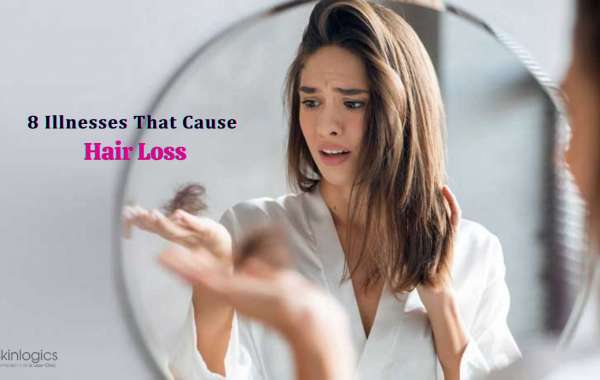As per a survey, more than 80% of men and nearly half of women experience hair loss sometime in their lives. And this is why it becomes difficult to deal with serious medical conditions. However, understanding the underlying medical conditions that lead to hair loss is crucial for early diagnosis and appropriate treatment.
In this comprehensive post, we have taken expert advice from the hair specialists at Skinlogics Clinic, who offer the best hair loss treatment in Noida. Through this post, we will explore the eight common illnesses that can cause hair loss and the best hair loss treatments available. Continue reading for more knowledgeable insights.
Here are the 8 Common Medical Conditions that Can Cause Hair Loss:
1. Androgenetic Alopecia
Up to 50% of men experience this common type of hair loss. Sensitivity to dihydrotestosterone (DHT) causes hair follicles to become shorter due to the shorter anagen phase. This results in thinner and shorter hair. The bitemporal (the sides or temples of the hairline), vertex (the top of the head), and mid-frontal scalp regions are where hair loss typically occurs. If discovered early, this non-scarring alopecia might be reversible.
2. Alopecia Areata
Alopecia areata affects almost all individuals, and it causes hair to fall out in round patches over the head. It is considered an autoimmune condition where the body’s immune system attacks the hair follicles. However, there are several treatments available, such as minoxidil, which helps treat this condition. This solution stimulates hair follicles and regrowth and is available without a prescription. If one is experiencing excessive hair loss, one can consult the hair experts at Skinlogics Clinic, who offer the best hair loss treatment in Noida.
3. Anemia
Hair may not grow in its usual way due to anemia, which affects hemoglobin levels and limits the quantity of oxygen that reaches follicles. The body uses oxygen from non-essential cells to support vital organs and functions. Hair loss often results from the inability of hair follicles to move from the resting to the growing stage of the growth cycle. Iron deficiency is considered a common cause of anemia.
4. Diabetes
Diabetes also leads to hair loss in several ways. If blood sugar levels are not checked timely, they can lead to vessel and tissue damage, which ultimately affects the body’s ability to produce new hair growth. However secondary medical conditions that arise from diabetes are also to blame.
5. Cancer
While cancer itself does not typically cause hair loss, the medical treatments and drugs that are used to treat it cause hair thinning. Anagen effluvium is a type of hair loss that is linked with chemotherapy. The condition occurs when the anagen hair gets exposed to harmful substances, which cause the hair shaft to break.
6. Scalp Infections
There are several scalp infections that lead to hair loss. These include seborrheic dermatitis, ringworm, psoriasis, etc. Each of these disrupts the function of hair follicles and prevents hair growth. For example, folliculitis leads to follicular inflammation and destroys follicles in severe cases. However, if a medical condition causes hair loss, the first and foremost step is identification. Consult with a dermatologist if you are affected by any of these medical conditions. They will analyze the cause of hair loss and provide an effective treatment accordingly.
7. Lupus
Lupus is an autoimmune condition where the immune system attacks healthy tissues. Hair loss is a common symptom of lupus, particularly when the condition is active and flaring. Proper management of lupus with medications can help prevent hair loss and promote hair regrowth.
8. Polycystic Ovary Syndrome (PCOS)
PCOS is a hormonal disorder that affects the ovaries and can lead to imbalances in sex hormones, including higher levels of androgens (male hormones) in females. One of the common symptoms of PCOS is hair thinning or female (or male)-pattern hair loss in women. Managing PCOS through lifestyle changes, medication, or hormonal therapy can help improve hair loss.
What are the Treatments Available to Treat Hair Loss?
The treatment options for hair fall are determined by its causes. So, before beginning with a hair fall treatment, one must consult a hair specialist who can identify the root cause of the hair fall problem. Following are the different types of treatments for hair loss:
- Oral Medications: Hair loss vitamins and several nutrients help in boosting an individual’s hair growth. There are some medications available that help block the hormone formation that causes hair fall in individuals. Therefore, this helps restore the hair to its previous state.
- Applying Scalp Lotions: Lotions such as minoxidil rogaine prevent hair fall, regrow hair, and increase the volume of hair by regenerating blood on the scalp area.
- Mesotherapy: Mesotherapy is a procedure that requires injections of vitamins and growth factors in order to promote new hair growth. This also helps boost blood circulation over the scalp.
- Dermaroller: Dermaroller is a procedure where a drum-shaped tool with small needles is rolled over the scalp to produce micro-injuries. This increases the production of growth factors, developing new hair follicles.
- Growth Factor Concentrate: This is a procedure that encourages the development of new hair follicles and boosts the thickness and volume of hair using the patient’s own blood. This is one of the most commonly suggested hair fall treatments all across the world. Usually, 8–12 sessions are recommended, depending on the severity of the hair fall and the expected results.
- Hair Transplant: A hair transplant is a permanent solution for treating hair fall problems. If there is permanent hair loss, none of the treatment options stated above would be able to restore hair growth. A hair transplant is an effective procedure where healthy hair follicles are transferred from the donor area to the front areas of the scalp (the recipient area). It is recommended for both men and women with a higher grade of hair loss due to androgenetic alopecia. It takes around 9–12 months to see full hair growth after a hair transplant procedure.
Final Takeaway
To sum it up, hair loss can be attributed to a wide range of factors, including genetics, aging, and lifestyle choices. However, it's crucial to remember that various medical conditions can also contribute to hair loss. In many cases, addressing the underlying health condition can help mitigate or reverse hair loss. Therefore, if one is experiencing significant or prolonged hair loss, it's essential to consult a dermatologist or hair specialist to identify the root cause and get an appropriate treatment plan.
One can consult the best dermatologist in Noida at Skinlogics Clinic, who offers the best treatments to treat hair fall problems. The treatments are customized according to the severity of the condition and the type of hair. Sometimes, hair experts might combine treatments to achieve the desired outcomes.
To avail the benefits of hair loss treatment, visit Skinlogics Clinic today and achieve healthier, thicker, and natural-looking hair!










